Resident Feeds Off-Duty Passion
A nonprofit, co-founded by a Miller School alumnus, delivers thousands of pounds of edible, but hard-to-sell, food to the needy from local retailers
By Maya Bell
Outdoor photography by Peter Freed
Indoor photography by Maya Bell
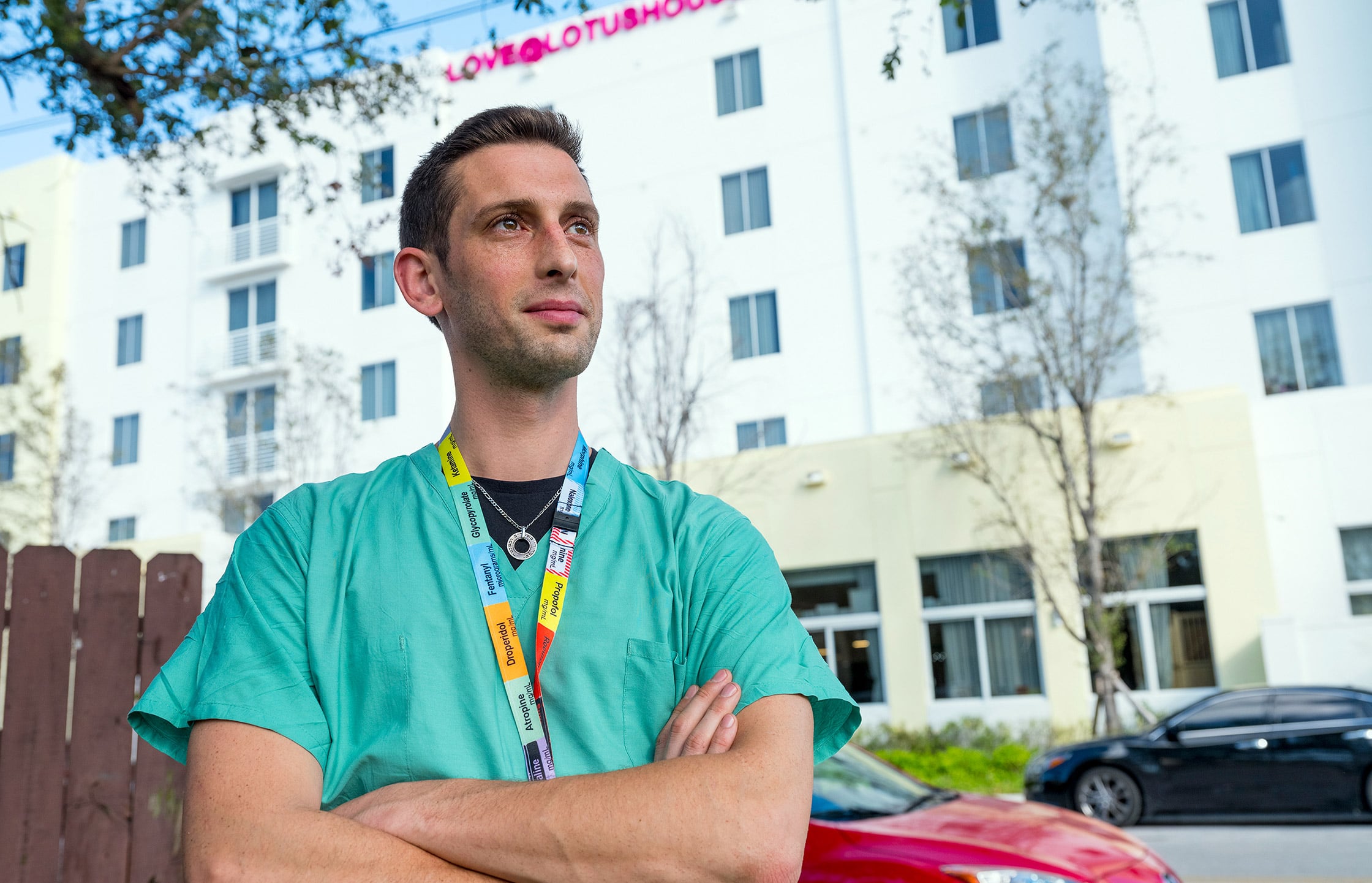
A
fter a 12-hour Saturday shift at Jackson Memorial Hospital — which included a kidney transplant, a craniotomy, and two intestinal surgeries — Evan Peskin, M.D. ’17, M.B.A. ’17, B.S. ’12, looked forward to one last appointment. The anesthesiology resident dropped by his favorite bakery to box up leftover Italian bread, pastries, and pasta waiting just for him.
The next morning, his only day off that week, Dr. Peskin and his wife would deliver the donated bounty to the Lotus House shelter for homeless women and children — a weekly ritual that began nearly a year ago. That’s when he and two friends, both Miami lawyers, founded Good Samaritan Meals, a small nonprofit with a big mission: putting good food destined to rot in landfills into the mouths of the hungry.
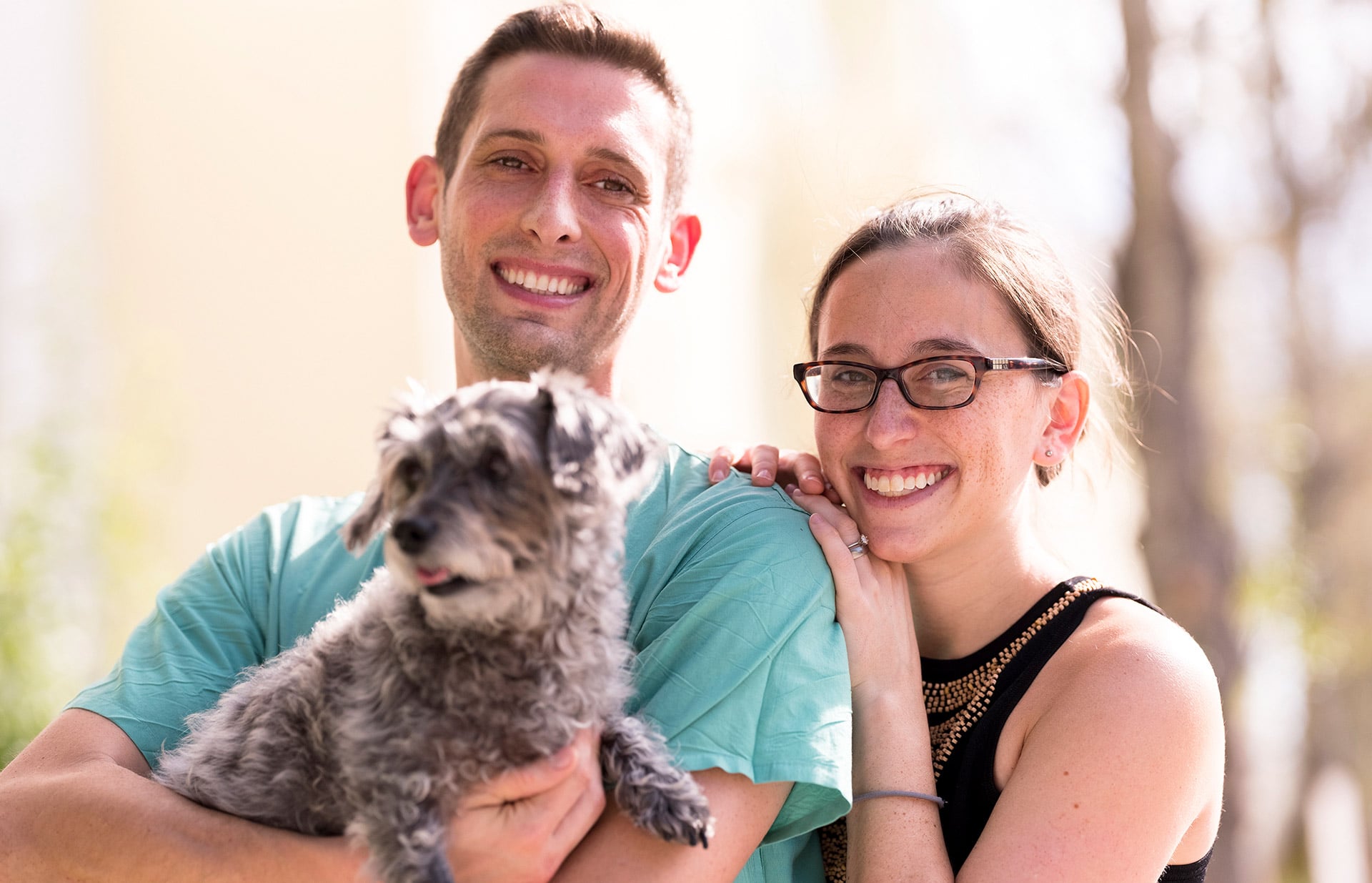
Evan Peskin, M.D. ’17, M.B.A. ’17, B.S. ’12, and Abby Pooch Peskin, B.S. ’12
“In my opinion, eating is one of life’s greatest pleasures,” said Dr. Peskin, whose passion for nourishing souls began in high school. “And I’ve never been hungry a day in my life. So, it just feels unfair that other people are, when so much good food is wasted every day — especially in the middle of a pandemic.”
Today Good Samaritan’s small but dedicated army of some 20 volunteers collects between 3,000 and 5,000 pounds of perfectly edible, but hard-to-sell, food from local grocery stores, restaurants, and bakeries every week. The volunteers then distribute their haul to organizations such as the Lotus House, Camillus House, Miami Rescue Mission, and the community refrigerators that another nonprofit, Buddy System, began installing in food deserts — neighborhoods with limited access to affordable, nutritious food — last summer.
Since then, Buddy System has connected Good Samaritan Meals to some of its most reliable volunteers — like Lily Winter, a UM sophomore studying health sciences who plans to be a nurse practitioner. Every Friday night, Winter is among the 10 or so volunteers who collect hundreds of pounds of ripening produce, prepared meals, and other slightly imperfect products from the South Beach Trader Joe’s, Good Samaritan’s single biggest donor.
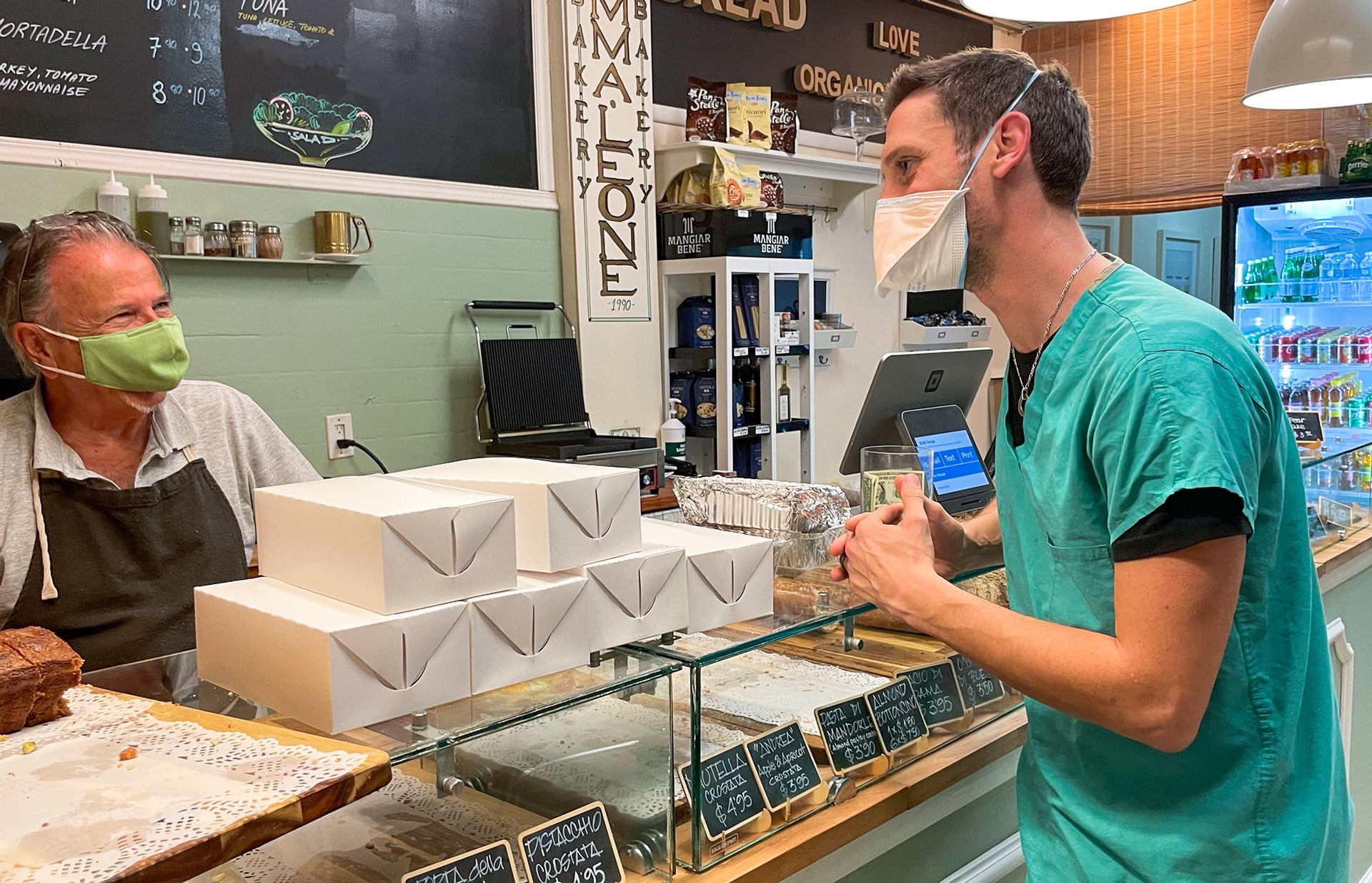
Dr. Evan Peskin picks up donated bakery goods from Giampiero Di Persia, owner of Mamma Leone Bakery in Miami.
Evan and Abby Peskin deliver bakery goods to Lotus House culinary director Betty Forcer.
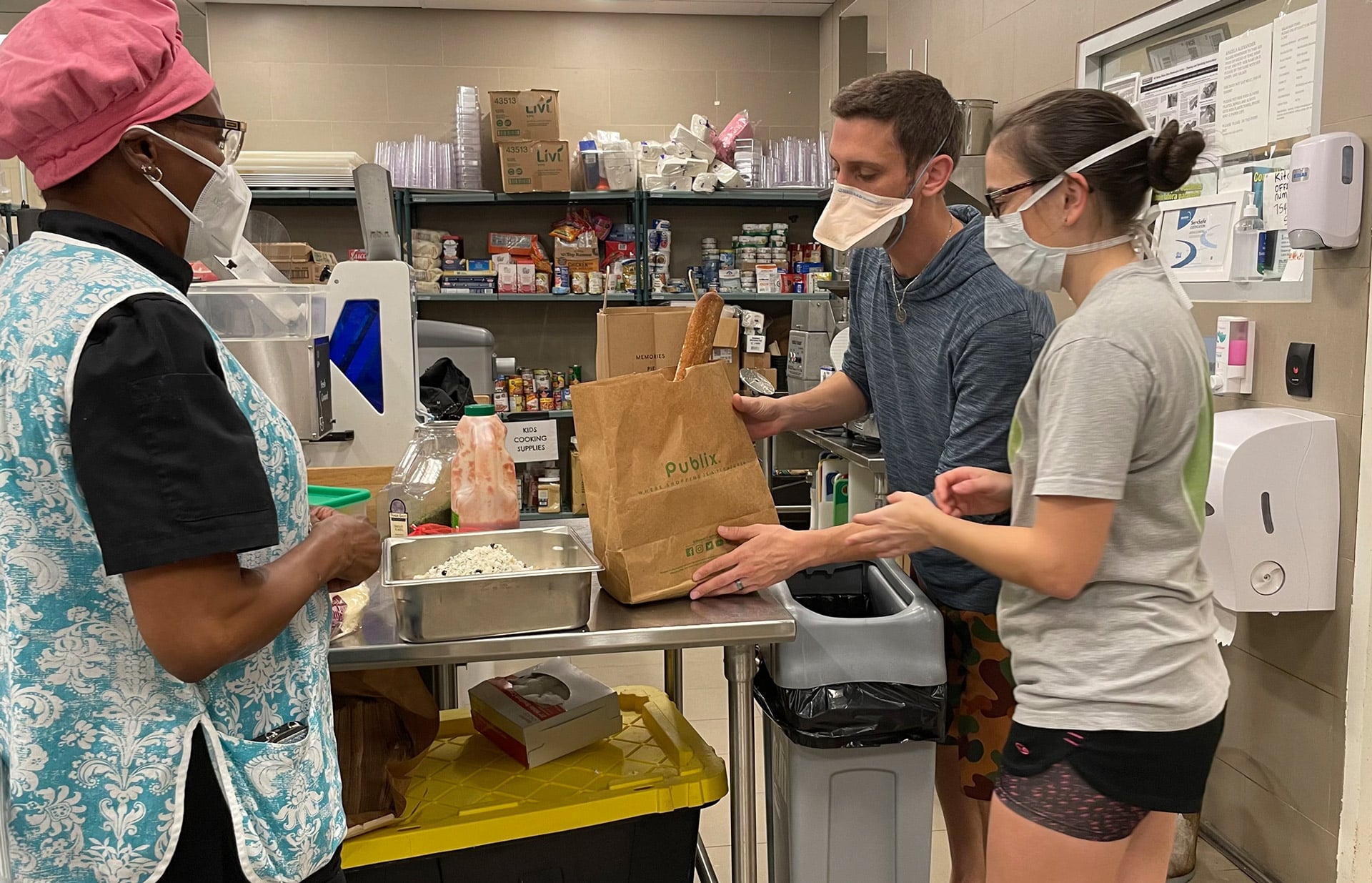
All you need is a car
“It’s not a chore. I really love it,” said Winter, who delivers the boxes she stuffs into her car to the community fridge in Coconut Grove and the Miami Rescue Mission. “It makes me happy knowing I’m helping someone — even in this small way. I know it is a tiny dent in a huge problem, but we need a lot of small dents to make a difference. And in this case, all you need to do it is a car.”
With volunteers like Winter, Dr. Peskin could delegate his weekly visit to Mamma Leone Bakery in Miami’s Edgewater neighborhood. But even though he is about to complete an anesthesiology residency, then specialize in chronic pain management, he wouldn’t think of it.
He and his wife, Abby Pooch Peskin, B.S. ’12, have grown too fond of owner Giampiero Di Persia and his wife, Benedetta, to abandon that routine. Dr. Peskin met Abby when they were juniors at UM, and she now works as a therapist at the Miller School’s Mailman Center for Child Development.
“The Di Persias were the very first people to support us, and to see him makes my day better,” Dr. Peskin said, as he boxed up a tray of pastries. “If there were more people like them, the world would be a better place.”
For Di Persia, whose wife begins baking at 4 a.m., the feeling is mutual and built on a shared passion with the Peskins.
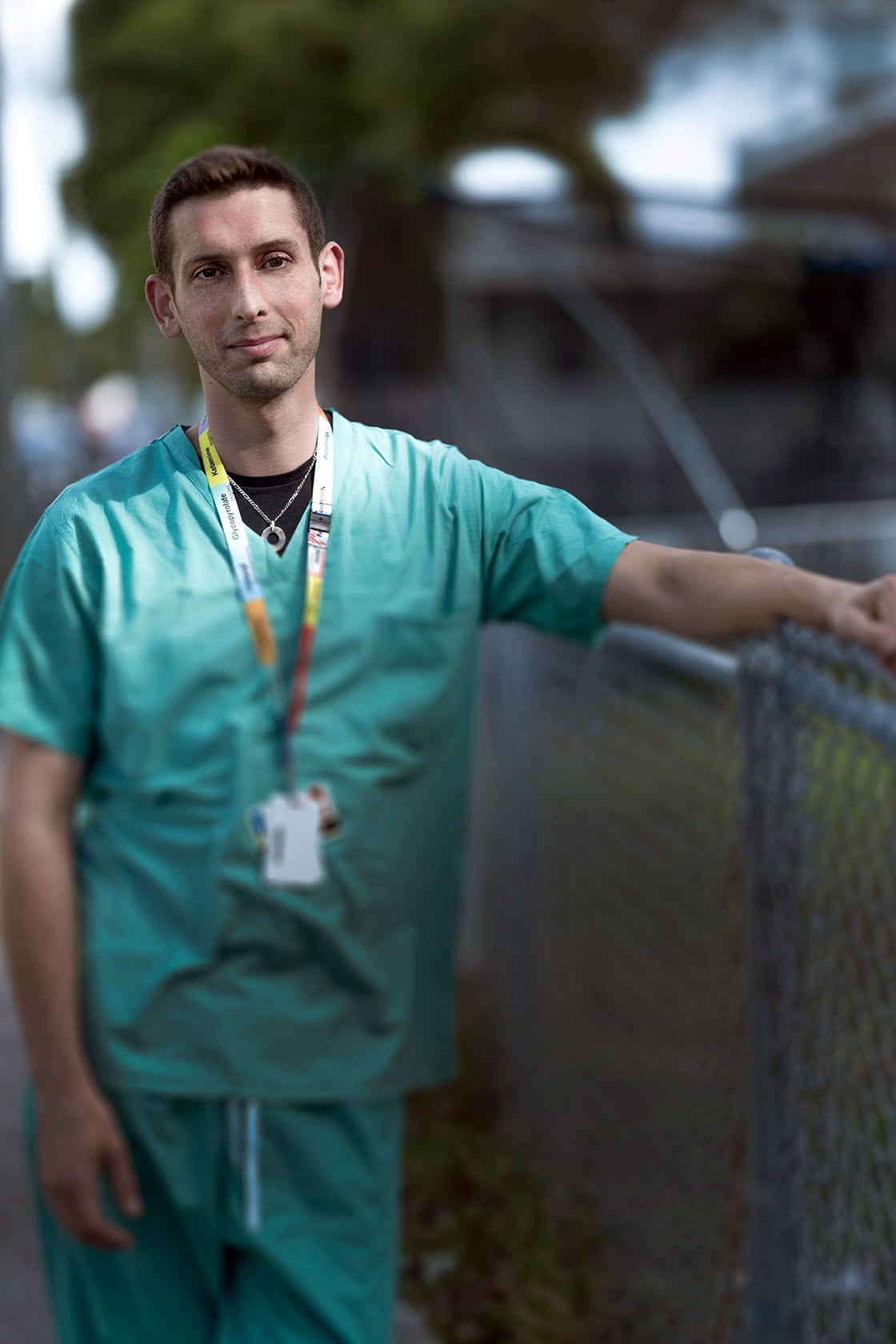
“We don’t want good food to go to waste, and we like to feed people in need,” Mr. Di Persia said. “But it was too hard for us to do on our own. Evan and Abby thank us when it is us who should thank them. We’re blessed to have someone do the footwork.”
Making donations easy
Making it easy for food producers to donate leftovers was a driving force behind Good Samaritan Meals, which derives its name from the Bill Emerson Good Samaritan Food Donation Act. Congress passed the law in 1996 to incentivize food donation to nonprofit organizations by minimizing the liability of participating providers.
“Essentially what it says is that grocery stores, restaurants, bakeries, and others that donate food to a nonprofit in good faith can’t be sued — if say, someone with an allergy has a bad reaction,” Dr. Peskin said. “There’s no documentation of that kind of lawsuit ever happening within the U.S. legal system, but they are still protected from that liability.”
Yet, the law is not an automatic enticement for many businesses. One major food supplier Dr. Peskin tried to recruit turned him down, citing its corporate bureaucracy. The manager of another popular Miami bakery told him their food “was too good for the homeless.”
An early commitment
Dr. Peskin found his cause long before he learned about the federal law. Growing up in Cleveland, Ohio, he and his high school friends worked with Trader Joe’s and small restaurants and bakeries to donate food to a shelter for battered women and children.
When it came time to choose a university, Dr. Peskin headed south to the University of Miami for its exceptional array of medical learning opportunities, including a trauma center and large community-oriented hospital, nationally known subspecialties, and a Veterans Affairs health system. “Everything you would want to see in medicine, you will see at this university,” Dr. Peskin said, noting that the Miller School also provided opportunities to work with underserved communities through the Mitchell Wolfson Sr. Department of Community Service program, or Wolfson DOCS.
While pursuing his M.B.A., along with his M.D., Dr. Peskin met one of his like-minded partners, Jacob Schofield, J.D. ’17, M.B.A. ’17. After studying, the pair would drive around Miami handing out burgers they bought from Checkers and bananas, meal bars, and water bottles from Publix.
“The first time, it took us an hour and a half to hand out 100 meals,” Dr. Peskin said. “But once we knew where to go, it took us 20 minutes. So, we knew there was a need.”
After they crossed paths with Miami lawyer Win Rutherfurd, the trio decided to formally organize a nonprofit dedicated to reducing food waste and providing meals to people in need. Now, just 10 months later, a growing number of food producers and charitable organizations are grateful for the small army of Good Samaritans enabling them to help people who are struggling.
As she accepted the packages from Mamma Leone’s on Sunday morning, chef Betty Forcer, the culinary director at the Lotus House shelter, already knew what to make with the baguette jutting out of one bag: croutons for the night’s salad.
“Nothing they bring goes to waste,” Ms. Forcer said. “And everything is appreciated.”![]()
To volunteer, donate food, or learn more, visit Good Samaritan Meals
or follow the organization’s efforts on Facebook or Instagram @goodsamaritanmeals.
Good Samaritan Meals

